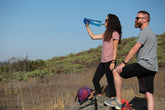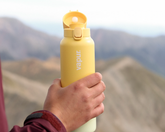Traveling is a great way to spend your free time. You get to explore new parts of the world, experience different cultures and enjoy quality time with friends and family. However, you have to ensure your travel adventures aren't doing harm to our planet. This is why you should learn more about zero waste travel.
Zero waste travel is a form of sustainable travel, that will help you minimize the negative influence the travel industry has on the environment. If you want to keep traveling but make a contribution to the world, we've got you covered.
Here’s a starter guide for zero waste travel that will help you pack for your next journey.
1. Shopping
When you're out there exploring the world, you'll be doing a lot of grocery shopping. You'll need to buy the food and products necessary for a smooth holiday or a well-prepared travel adventure.
While buying groceries, you need to be aware of the following:
- plastic bags are bad for the environment
- it takes them several hundred years to decompose
- they pollute the oceans and other natural environments
If you want to go zero waste, you have to ensure you don’t take any plastic bags out of the supermarkets and grocery shops.
What to pack?
Pack a reusable cloth bag, that’s easy to fold and carry in your backpack, beach bag, or handbag wherever you go. This way, you’ll have it by your side always and you’ll never feel tempted to take a plastic bag instead.
2. Water
Hydration is important especially if your travel arrangement requires you to spend time in nature and be physically active.
That means you always need to have a bottle of water on your hand and make sure you get enough hydration.
The only problem is, you shouldn’t buy bottled water, and here’s why:
- you’re creating plastic waste
It’s that simple.
If you continue buying bottled water, you'll end up making a huge amount of plastic waste and that’ the opposite of what you should do. Luckily, there’s a solution.
What to pack?
Pack a reusable water bottle that will allow you to refill each time you finish it. Make sure you prepare for both cases:
- the country has drinkable tap water
You’ll only need a reusable water bottle to refill.
- tap water isn’t drinkable
You can buy a bottle that has filters that remove all the toxins and make the water drinkable. You can also refill at restaurants that use good water for cooking (ask politely).
3. Personal Hygiene
When we travel, we tend to buy a whole bunch of personal hygiene products and bring them along. This is normal since you want to take care of your hygiene and health.
But, the truth is we sometimes overdo it.
Also, we use a lot of products that quickly become waste:
- plastic toothbrushes
- pads and tampons
- disposable plastic razors
- makeup remover wipes
- cotton balls
- bottled shower gel
Most of these products are single-use, or disposable and made of plastic. Luckily for all of us, there are substitute products you can use.
You’ll still be able to take care of your hygiene but stay zero waste.
What to pack?
Pack a suitable substitute product for each of the ones we’ve listed above:
- menstrual cup or reusable pads
- metal razor
- reusable cotton rounds
- bar soap
"There is a zero-waste substitute for almost every modern hygienic product that we're so used to using. Just give the alternative version a shot and you'll see there's not much difference," says Kristin Savage, a travel blogger and writer at Top Essay Writing and Classy Essay.
4. Takeaway Food
If you aren't that great of a cook or your travel plans don't allow you to cook at your accommodation, you'll be eating a significant amount of takeaway food.
While there’s nothing wrong with eating local food and trying out their famous specialties, takeaway food introduces another source of plastic waste:
- single-use plastic containers
- plastic forks, knives, and spoons
This means that each takeaway you purchase will contribute to plastic waste production.
In order to avoid this, you need to pack wisely.
What to pack?
Pack your own food containers and a set of utensils. When you go out to eat, ask the employees to:
- pack the food in your food container
- not give you any utensils
Your reusable Tupperware or another kind of food container will reduce the amount of plastic waste you produce and help you stay zero waste during your trip.
5. Accommodation
Finally, there’s one last thing you can do to ensure your entire trip is zero waste and you’ve done everything that’s in your power to save your planet.
Choosing the accommodation you’ll be staying in makes all the difference in the world.
While there are some eco-friendly, sustainable hotels, hostels, or apartments for rent, others aren't as aware as you'd like them to be.
This is why you have to pick the right accommodation:
- responsible for sustainability
- washing your sheets and towels only when you request
- using eco-friendly detergents
- using energy-saving light bulbs
- using natural sources of energy
- doing proper waste disposal
Do your research and some online digging to find the right type of accommodation.
What to pack?
Make sure that you pack a positive attitude and an open mind. Thank the hosts for offering you a zero waste accommodation option and let them know how much it means to you and the entire travel community.
Final Thoughts
Zero waste travel is not as demanding or as hard as you may have thought it was. All you need is good preparation and a determination to stay zero waste.
Use the advice listed above and make sure you make your packing checklist. Pack wisely and bring everything you need in order to stay zero waste.



